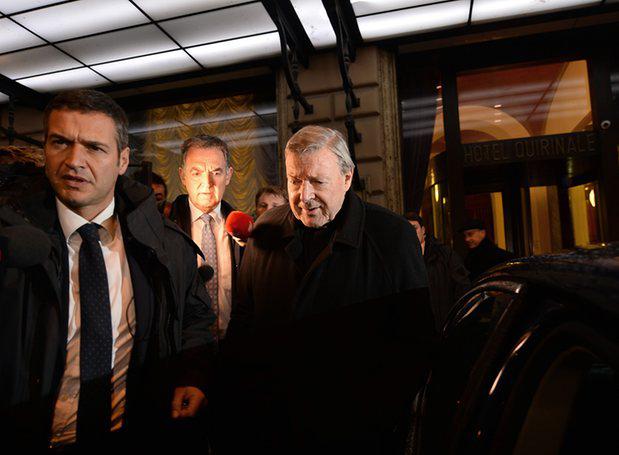|
George Pell wasn't much interested in stories of abuse by priests. Which was lucky for his career
By David Marr
[with video] Here’s my theory. George Pell returned to Ballarat as a young priest with big plans. And why not? He’d gone from Rome to Oxford, where he reckons he was the first Catholic priest to earn a doctorate of philosophy since the Reformation.Big things were expected of him back in Australia. He expected big things of himself. But for the next 25 years he found himself serving bishops whose record of handling paedophile priests was (in Ballarat) appalling and (in Melbourne) seriously flawed. Pell is seeing out his career as cardinal in charge of the Vatican’s finances. But what would have happened to his mighty career if early on he had crossed those bishops? Had young Pell made it his business to find why the paedophile Father Gerald Ridsdale was being shifted from parish to parish in the 1970s – in later years by a committee on which he himself sat – he might well be living the twilight years of his career not in Rome but the seaside parish of Warrnambool. From Pell’s evidence on the second day of his Roman cross-examination there emerged a picture of an ambitious and capable young priest who decided, early on, to steer clear of this dangerous issue. On Monday Pell admitted knowing bits and pieces about some of the offenders and some of their crimes in Ballarat. He earned credibility for that. But on Tuesday he swore blind he knew nothing about the worst of them all: Ridsdale. Fellow priests who knew the truth told him nothing. Complaints rife in several parishes never reached him. And his bishop, Ronald Mulkearns, never let him know about the complaints of Ridsdale’s abuse he had been fielding for a decade. Pell called Mulkearns’ silence “a gross deception”. But the devastating admission drawn from Pell by Gail Furness SC, counsel assisting the royal commission into institutional responses to child sexual abuse, was that he never bothered to ask. “It was a sad story and of not much interest to me,” he told the commission. By the late 1970s he was a busy priest running the Catholic Institute of Education. “I had no reason to turn my mind to the evils Ridsdale had perpetrated.” Except that he still sat on the committee moving Ridsdale around Ballarat, leaving – as he admits now – fresh victims behind every time and finding new ones in every new parish. Pell never asked anyone, it seems, why this priest was shifted every couple of years, from Apollo Bay to Inglewood to Edenhope to Bungaree to Kangaroo Flat to Mortlake and, finally, to a desk job in Sydney. “It could have been the man was perpetually restless,” ventured the cardinal. Furness was lethal. The commission’s chair, Peter McClellan, joined her in a brutal tag team. Pell reeled, blustered and hectored. At times McClellan gave the impression of a man on the point of explosion. Pell lectured the commission on canon law. His point? To explain the power of the hierarchy, the authority of bishops and the lowly place of priests in that pecking order. He heaped all the blame on Mulkearns. Furness was unimpressed. Priests, assistant priests, episcopal advisers and several members of that Ballarat committee on which Pell sat all knew the truth about Ridsdale and didn’t act. Wasn’t the failure in Ballarat a general failure? “That is a vast and misleading statement,” snapped Pell. Furness and McClellan homed in on the responsibility of individual priests like him: if bishop didn’t act to save children, weren’t priests compelled to act? Pell insisted a priest’s responsibility, while never nil, depended on their place in the hierarchy. Bishops remain in charge. So what does a priest do who is worried by the inaction of his bishop? Write to the Papal Nuncio. There was laughter in the Sydney hearing room through much of this. Muffled crowd noises were coming down the line from Rome. Was I alone in wishing Furness would ask: should they call the cops? Pell answered the question unasked. “I’m not sure at that stage there was even a civic responsibility to report such a crime.” The cardinal was speaking from the heart. By the look of things he has failed to convince the royal commission that he did his duty by the children of Ballarat. But he has surely convinced them of his loyalty to the hierarchical church. “A priest has a moral responsibility to do what is appropriate to his position,” he declared in the last minutes of his evidence. McClellan countered: “Isn’t it a moral responsibility to do whatever he can to bring the conduct to a halt?” Pell replied: “I think that’s a reasonable position.” But reading that as a concession would be a mistake. In Pell’s world, a priest can only do so much. And his evidence to the commission on Monday suggests that in his Ballarat years, that wasn’t a lot. His whole life lay before him.
|
.
Any original material on these pages is copyright © BishopAccountability.org 2004. Reproduce freely with attribution.
